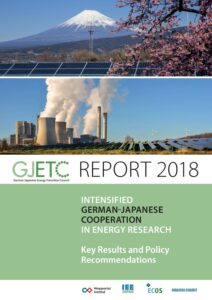The challenges and also potentials of the energy transition are tremendous in Germany, as well as in Japan. Sometimes, structures of the old energy world need “creative destruction” to clear the way for innovations for a decarbonized, low-risk energy system. In these times of disruptive changes, a constructive and sometimes controversial dialog within leading industrial nation as Japan and Germany over the energy transition is even more important. The German-Japanese Energy Transition Council (GJETC) today released results of two years of fruitful dialogue.
The German-Japanese Energy Transition Council is an international model project to strengthen the exchange of knowledge over technologies, policies and the effects of the energy transition. The concept is based on the conviction that joint solutions accelerate the realization of the energy transition, if national differences, different interests, motivations and values between the partner are made transparent, clearly articulated and respected. This can also serve as an example for other countries.
Besides the 800 pages of study results of the German-Japanese research consortia on core subjects of the energy transition, the council also published a row of strategical input papers. In three stakeholder dialogues with the industry, with producers and users of energy efficiency technologies and with decentralized actors of the energy transition, as well as in two outreach events with 100 participants each the Council continuously searched for a broad discussion with the public.
Today, the council presented a summarizing report for the first project phase. It includes jointly formulated recommendations for politics as well as a controversial dialogue part. Around 80 experts from ministries, industry and academia as well as parliamentarians and NGOs attended the presentation of the report in the Press and Visitors’ Center of the Federal Government in Berlin.
The Council jointly states and recommends that:
- Ambitious long-term targets and strategies for a low-carbon energy system must be defined and ambitiously implemented; Germany and Japan as high technology countries need to take the leadership.
- Both countries will have to restructure their energy systems substantially until 2050 while maintaining their competitiveness and securing energy supply.
- Highest priority is given to the forced implementation of efficiency technologies and renewable energies, despite different views on nuclear energy.
- In both countries all relevant stakeholders – but above all the decision-makers on all levels of energy policy – need to increase their efforts for a successful implementation of the energy transition.
- Design of the electricity market needs more incentives for flexibility options and for the extensive expansion of variable power generation, alongside with strategies for cost reduction for electricity from photovoltaic and wind energy.
- The implementation gap of the energy efficiency needs to be closed by an innovative energy policy package to promote the principle of “Energy Efficiency First”.
- Synergies and co-benefits of an enhanced energy and resource efficiency policy need to be realized.
- Co-existence of central infrastructure and the growing diversity of the activities for decentralization (citizens funding, energy cooperatives, establishment of public utility companies) should be supported.
- Scientific cooperation can be intensified by a joint working group for scenarios and by the establishment of an academic exchange program.
The members of the Council jointly determined that “the GJETC has created a format and role model, that enables science-based policy advice, close to politics but independent from political interference.“ The members of the Council therefore agreed that the successful work of the GJETC should be continued and raised to a new level in a second phase (2018-2020).


